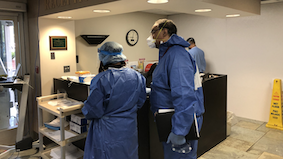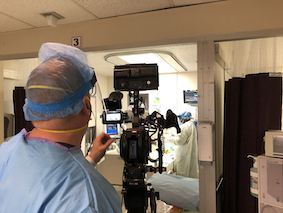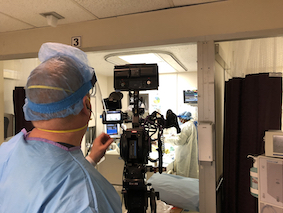
Medical staff members prepare for a day of COVID-19 testing at Roseland Community Hospital. (Photo: CGTN)
A father holds his young son in his arms. A nurse draws blood. The needle prick brings a flood of tears from the young boy. The blood sample will be tested to see if the child has been infected with COVID-19.
It is a simple procedure being carried out at Roseland Community Hospital in south Chicago, one of the city's poorest neighborhoods. But in the future, there is the possibility that families here will have to travel much, much farther to find healthcare services.
Roseland finds itself at the heart of the COVID-19 pandemic. The virus has exposed healthcare inequalities across the U.S., notably in Chicago. Although the virus does not discriminate, the mortality rate is disproportionately higher among African-Americans.
The hospital has set up both a drive-thru and walk-in COVID-19 testing site. Data collected from those tests will also help local officials decide when and how to reopen the economy. If the number of people here testing positive for COVID-19 goes down, it is a good indication that the worst is over in Chicago.
But today, that day feels some way off.

Filming in Roseland Community Hospital's ICU ward. (Photo: CGTN)
"Because we only have a 10-bed ICU, we have some patients who might remain in the emergencies room overnight because we don't have the bed capacity. So they may have to remain there for 24-48 hours prior to being transferred to the ICU room as we are so stretched with those beds," said Dr. Terrill Applewhite, chairman of the hospital's COVID-19 task force. Given the high crime rate in the area, the wing is busy year round. But since COVID-19 arrived, the unit has come under even more pressure.
A patient flatlines, six staff members run over to the patient, then another six within seconds. They perform CPR, inject vasopressin and use a defibrillator for about 14 minutes. Eventually the patient comes back. It is exhausting work and the staff does it again and again. The ICU staff is dedicated. They throw everything they have into their work.
The hospital was already facing crippling funding issues when the pandemic hit. COVID-19 has heaped yet more pressure, and debt, on the hospital. "It is ruining our hospital. Because we have had to make a huge investment in staff, we've had to make a huge investment in equipment, in testing. We are on a thread. We are in debt and now we are in a bigger debt because of all this investment we've had to make because of COVID-19," Tim Egan, president and CEO of the hospital, said.
And then there is the toll on the medical staff. Since March, many have had to work long shifts, day after day. "The emotional and physical toll has been tremendous. In the beginning, it was 12- to 14-hour days, every day or more. I am proud to work shoulder to shoulder with a lot of these people because they have shown me that if we come together as a community and staff, we can provide a lot for this community at large," Applewhite said.

Roseland's entrance has been converted into a COVID-19 testing site. (Photo: CGTN)
"It is devastating. We can't have funerals for their loved ones," Paula Johnson, a nurse in the ICU wing, told CGTN. "They can't see them. Some of these people, they are leaving to the morgue or a funeral home. And their loved ones don't get a chance to say goodbye.”
The long-term future of the hospital is in doubt. It has once again proven its worth to the community and to Chicago, but the years of disinvestment have seemingly caught up. "Here is the investment portfolio for Roseland Community Hospital. I play the damn lottery every week, praying I can hit the jackpot, so I can make an investment in this hospital," Egan, holding some lottery tickets, added.


